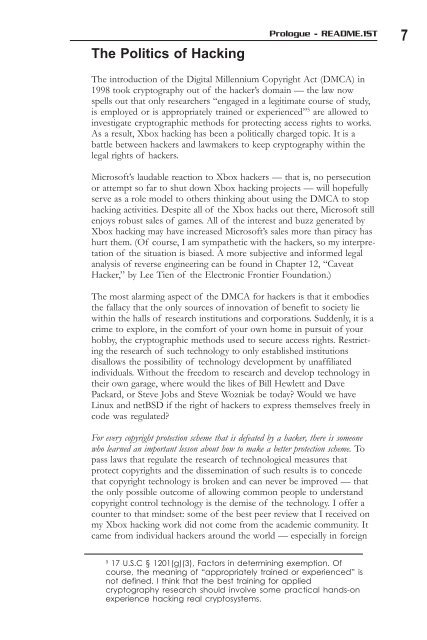Hacking the Xbox
Hacking the Xbox
Hacking the Xbox
You also want an ePaper? Increase the reach of your titles
YUMPU automatically turns print PDFs into web optimized ePapers that Google loves.
The Politics of <strong>Hacking</strong><br />
Prologue - README.1ST 7<br />
The introduction of <strong>the</strong> Digital Millennium Copyright Act (DMCA) in<br />
1998 took cryptography out of <strong>the</strong> hacker’s domain — <strong>the</strong> law now<br />
spells out that only researchers “engaged in a legitimate course of study,<br />
is employed or is appropriately trained or experienced” 5 are allowed to<br />
investigate cryptographic methods for protecting access rights to works.<br />
As a result, <strong>Xbox</strong> hacking has been a politically charged topic. It is a<br />
battle between hackers and lawmakers to keep cryptography within <strong>the</strong><br />
legal rights of hackers.<br />
Microsoft’s laudable reaction to <strong>Xbox</strong> hackers — that is, no persecution<br />
or attempt so far to shut down <strong>Xbox</strong> hacking projects — will hopefully<br />
serve as a role model to o<strong>the</strong>rs thinking about using <strong>the</strong> DMCA to stop<br />
hacking activities. Despite all of <strong>the</strong> <strong>Xbox</strong> hacks out <strong>the</strong>re, Microsoft still<br />
enjoys robust sales of games. All of <strong>the</strong> interest and buzz generated by<br />
<strong>Xbox</strong> hacking may have increased Microsoft’s sales more than piracy has<br />
hurt <strong>the</strong>m. (Of course, I am sympa<strong>the</strong>tic with <strong>the</strong> hackers, so my interpretation<br />
of <strong>the</strong> situation is biased. A more subjective and informed legal<br />
analysis of reverse engineering can be found in Chapter 12, “Caveat<br />
Hacker,” by Lee Tien of <strong>the</strong> Electronic Frontier Foundation.)<br />
The most alarming aspect of <strong>the</strong> DMCA for hackers is that it embodies<br />
<strong>the</strong> fallacy that <strong>the</strong> only sources of innovation of benefit to society lie<br />
within <strong>the</strong> halls of research institutions and corporations. Suddenly, it is a<br />
crime to explore, in <strong>the</strong> comfort of your own home in pursuit of your<br />
hobby, <strong>the</strong> cryptographic methods used to secure access rights. Restricting<br />
<strong>the</strong> research of such technology to only established institutions<br />
disallows <strong>the</strong> possibility of technology development by unaffiliated<br />
individuals. Without <strong>the</strong> freedom to research and develop technology in<br />
<strong>the</strong>ir own garage, where would <strong>the</strong> likes of Bill Hewlett and Dave<br />
Packard, or Steve Jobs and Steve Wozniak be today? Would we have<br />
Linux and netBSD if <strong>the</strong> right of hackers to express <strong>the</strong>mselves freely in<br />
code was regulated?<br />
For every copyright protection scheme that is defeated by a hacker, <strong>the</strong>re is someone<br />
who learned an important lesson about how to make a better protection scheme. To<br />
pass laws that regulate <strong>the</strong> research of technological measures that<br />
protect copyrights and <strong>the</strong> dissemination of such results is to concede<br />
that copyright technology is broken and can never be improved — that<br />
<strong>the</strong> only possible outcome of allowing common people to understand<br />
copyright control technology is <strong>the</strong> demise of <strong>the</strong> technology. I offer a<br />
counter to that mindset: some of <strong>the</strong> best peer review that I received on<br />
my <strong>Xbox</strong> hacking work did not come from <strong>the</strong> academic community. It<br />
came from individual hackers around <strong>the</strong> world — especially in foreign<br />
5 17 U.S.C § 1201(g)(3), Factors in determining exemption. Of<br />
course, <strong>the</strong> meaning of “appropriately trained or experienced” is<br />
not defined. I think that <strong>the</strong> best training for applied<br />
cryptography research should involve some practical hands-on<br />
experience hacking real cryptosystems.


